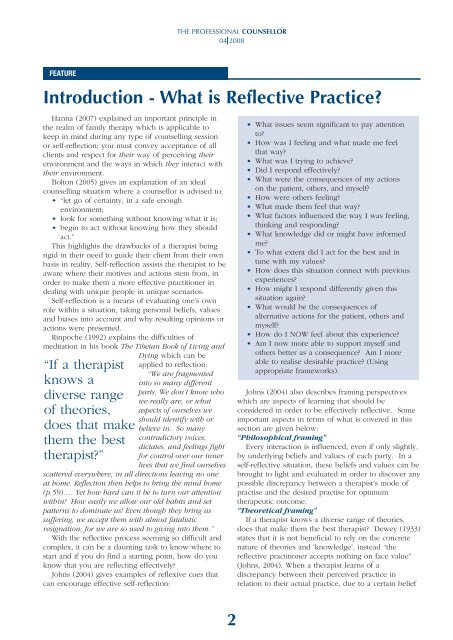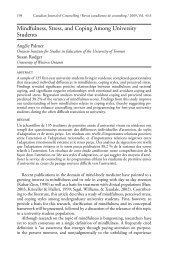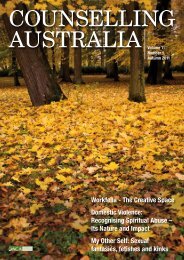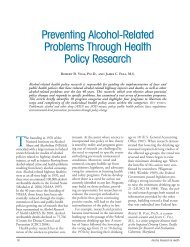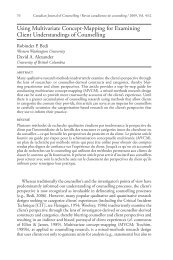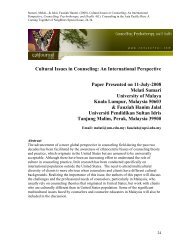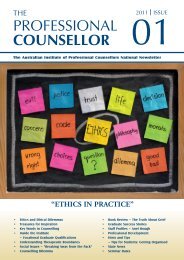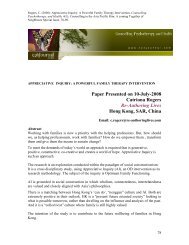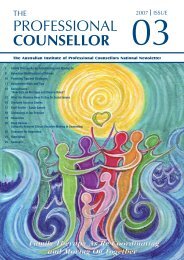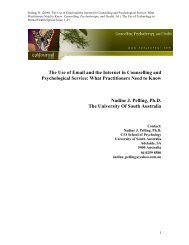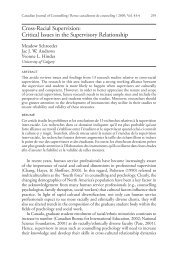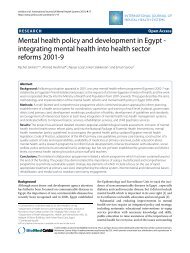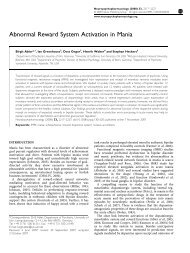Counselling Practice - Becoming a Reflective Practitioner
Counselling Practice - Becoming a Reflective Practitioner
Counselling Practice - Becoming a Reflective Practitioner
Create successful ePaper yourself
Turn your PDF publications into a flip-book with our unique Google optimized e-Paper software.
THE PROFESSIONAL COUNSELLOR<br />
04 2008<br />
FEATURE<br />
Introduction - What is <strong>Reflective</strong> <strong>Practice</strong><br />
Hanna (2007) explained an important principle in<br />
the realm of family therapy which is applicable to<br />
keep in mind during any type of counselling session<br />
or self-reflection; you must convey acceptance of all<br />
clients and respect for their way of perceiving their<br />
environment and the ways in which they interact with<br />
their environment.<br />
Bolton (2005) gives an explanation of an ideal<br />
counselling situation where a counsellor is advised to:<br />
• “let go of certainty, in a safe enough<br />
environment;<br />
• look for something without knowing what it is;<br />
• begin to act without knowing how they should<br />
act.”<br />
This highlights the drawbacks of a therapist being<br />
rigid in their need to guide their client from their own<br />
basis in reality. Self-reflection assists the therapist to be<br />
aware where their motives and actions stem from, in<br />
order to make them a more effective practitioner in<br />
dealing with unique people in unique scenarios.<br />
Self-reflection is a means of evaluating one’s own<br />
role within a situation, taking personal beliefs, values<br />
and biases into account and why resulting opinions or<br />
actions were presented.<br />
Rinpoche (1992) explains the difficulties of<br />
meditation in his book The Tibetan Book of Living and<br />
Dying which can be<br />
“If a therapist<br />
knows a<br />
diverse range<br />
of theories,<br />
does that make<br />
them the best<br />
therapist”<br />
applied to reflection:<br />
“We are fragmented<br />
into so many different<br />
parts. We don’t know who<br />
we really are, or what<br />
aspects of ourselves we<br />
should identify with or<br />
believe in. So many<br />
contradictory voices,<br />
dictates, and feelings fight<br />
for control over our inner<br />
lives that we find ourselves<br />
scattered everywhere, in all directions leaving no one<br />
at home. Reflection then helps to bring the mind home<br />
(p.59)…. Yet how hard can it be to turn our attention<br />
within! How easily we allow our old habits and set<br />
patterns to dominate us! Even though they bring us<br />
suffering, we accept them with almost fatalistic<br />
resignation, for we are so used to giving into them.”<br />
With the reflective process seeming so difficult and<br />
complex, it can be a daunting task to know where to<br />
start and if you do find a starting point, how do you<br />
know that you are reflecting effectively<br />
Johns (2004) gives examples of reflexive cues that<br />
can encourage effective self-reflection:<br />
• What issues seem significant to pay attention<br />
to<br />
• How was I feeling and what made me feel<br />
that way<br />
• What was I trying to achieve<br />
• Did I respond effectively<br />
• What were the consequences of my actions<br />
on the patient, others, and myself<br />
• How were others feeling<br />
• What made them feel that way<br />
• What factors influenced the way I was feeling,<br />
thinking and responding<br />
• What knowledge did or might have informed<br />
me<br />
• To what extent did I act for the best and in<br />
tune with my values<br />
• How does this situation connect with previous<br />
experiences<br />
• How might I respond differently given this<br />
situation again<br />
• What would be the consequences of<br />
alternative actions for the patient, others and<br />
myself<br />
• How do I NOW feel about this experience<br />
• Am I now more able to support myself and<br />
others better as a consequence Am I more<br />
able to realise desirable practice (Using<br />
appropriate frameworks).<br />
Johns (2004) also describes framing perspectives<br />
which are aspects of learning that should be<br />
considered in order to be effectively reflective. Some<br />
important aspects in terms of what is covered in this<br />
section are given below:<br />
“Philosophical framing”<br />
Every interaction is influenced, even if only slightly,<br />
by underlying beliefs and values of each party. In a<br />
self-reflective situation, these beliefs and values can be<br />
brought to light and evaluated in order to discover any<br />
possible discrepancy between a therapist’s mode of<br />
practise and the desired practise for optimum<br />
therapeutic outcome.<br />
“Theoretical framing”<br />
If a therapist knows a diverse range of theories,<br />
does that make them the best therapist Dewey (1933)<br />
states that it is not beneficial to rely on the concrete<br />
nature of theories and ‘knowledge’, instead “the<br />
reflective practitioner accepts nothing on face value”<br />
(Johns, 2004). When a therapist learns of a<br />
discrepancy between their perceived practice in<br />
relation to their actual practice, due to a certain belief<br />
2


